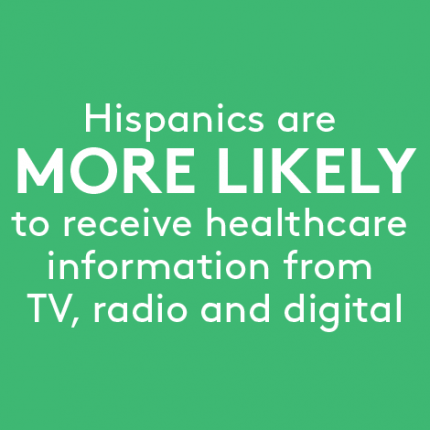Earlier this year, Univision worked with Latinum to get a better understanding of how Hispanics access healthcare information, how much they trust these sources and how they take action when receiving information.
The results were consistent with research conducted by Pew in 2008. Hispanics have the same motivators and attitudes in how they receive healthcare information, and they can still be reached the same way, too—whether it’s through clinics, doctors or TV. Here’s more of what we learned.
Trust Multiple Sources
Doctors are the most trusted source of healthcare information for both Hispanics and non-Hispanics. However, Hispanics seem to trust significantly more. In fact, Hispanics are much more likely to say doctors (66% vs. 58% for non-Hispanics), clinics (54% vs. 31% for non-Hispanics) and hospitals (56% vs. 37% for non-Hispanics) are extremely trustworthy.
Pharmacists, however, have a lower trust score – only 38% say they find pharmacists extremely trustworthy vs. 50% of non-Hispanics. This may be because the role of the pharmacist is very different in the U.S. than in many Hispanic countries of origin. In Latin America, pharmacists develop relationships with their customers and spend time listening to their needs. They are considered true partners in the Latino healthcare universe. U.S. pharmacies stand to gain a lot with Hispanic patients if they work on building those relationships, too.
More Likely to Take Action
TV, radio and digital play a strong role in how Hispanics receive health information. And, across the board, Hispanics are more likely to take action from the information they receive vs. non-Hispanics. For example, Hispanics are at least 23% more likely than non-Hispanics to say that online, TV or radio healthcare messages “led me to see a doctor or medical professional about a specific drug.” When you dig deeper, Hispanic women are even more likely to take action than their male counterparts. This suggests that healthcare marketers may see better results if they target their campaigns toward these Chief Medical Officers of the household.
Hispanics are listening to, trusting and reacting to healthcare messages from many sources. We also know that they tend to worry more about the health and wellness of their families (78% say they worry a “great deal” vs. 59% of non-Hispanics). The healthcare marketers that build relationships and work to take that worry away will benefit from better brand engagement…and contribute to healthier lifestyles overall.


